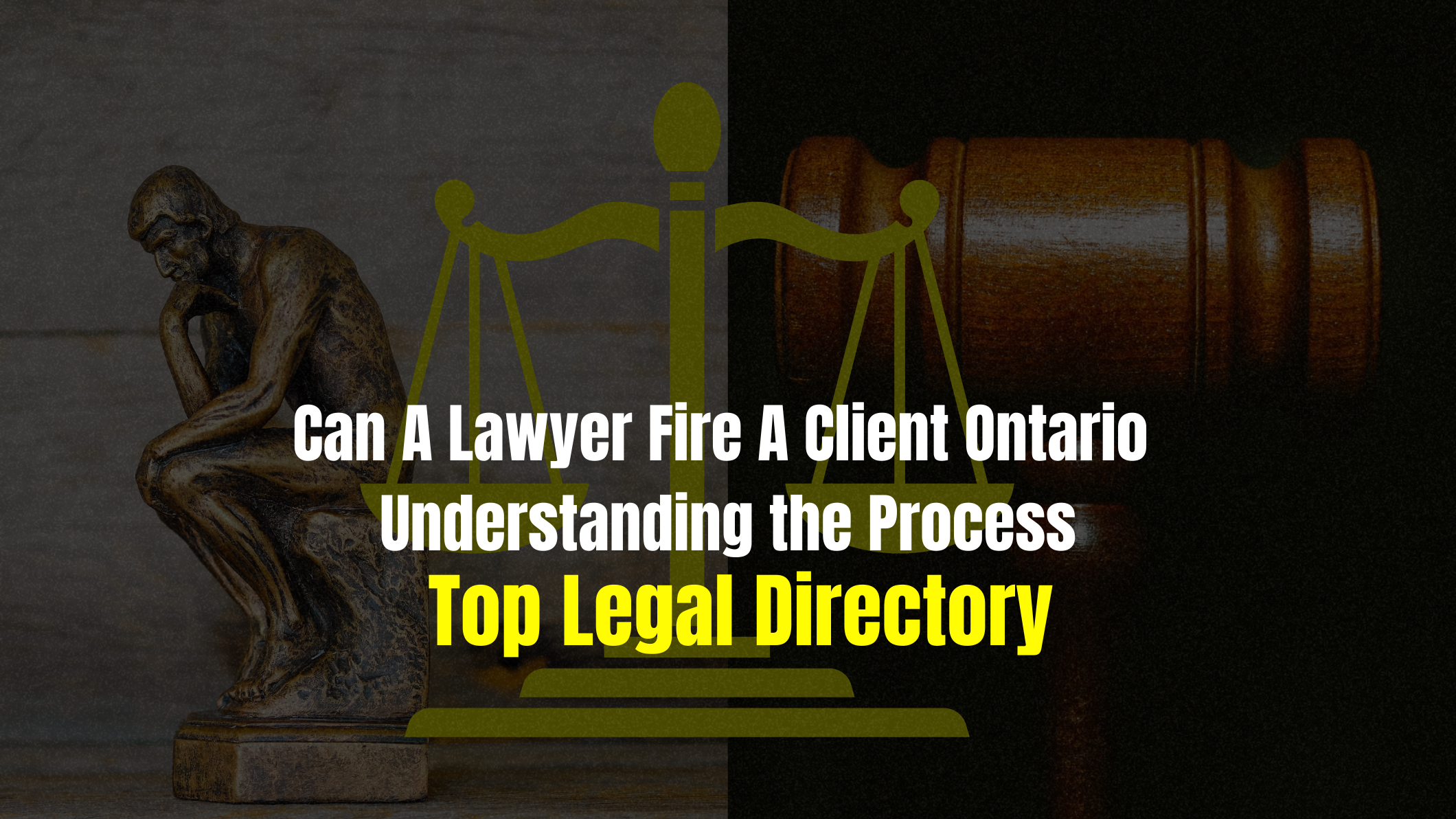Can a Lawyer Fire a Client in Ontario? – Understanding the Process
Within Ontario’s legal framework, a common query arises: can a lawyer fire a client in Ontario?
This inquiry delves into the intricate balance of the relationship between a lawyer and their client, a connection underpinned by trust and mutual understanding.
Although clients possess the freedom to sever this bond as they deem necessary, the guidelines for lawyers are more rigid, aiming to safeguard the interests of everyone concerned.
In Ontario, while clients have the flexibility to terminate their lawyer-client relationship at any given time, lawyers can only do so with valid reasons. This distinction is crucial in maintaining the integrity and trust inherent in the legal process.
Can a Lawyer Fire a Client in Ontario? – A Brief Guide
Understanding the realm of legal relationships in Ontario is crucial, especially regarding the delicate bond between lawyers and clients.
While a client can end this relationship for various reasons, from dissatisfaction to personal changes, a lawyer’s decision to do the same is more nuanced. They must have significant grounds, be it the client’s misconduct, a conflict of interest, or even personal reasons that inhibit their capacity to serve.
This distinction highlights the intricate dynamics at play, ensuring both parties’ rights and interests remain protected in the complex world of legal representation.
Ending Legal Representation: Lawyer’s Rights in Ontario
The attorney-client relationship stands as a bedrock principle within the legal system.
Built upon a foundation of trust and mutual respect, it creates a safe space for individuals to seek justice and representation. This bond is a testament to the legal profession’s commitment to upholding individual rights.
However, like every professional connection, it is governed by specific guidelines and boundaries, ensuring that both parties’ interests are protected and respected.
Brief Overview of the Lawyer-Client Relationship
Entering into a lawyer-client relationship is not merely a transactional decision. It’s a commitment to a unique relationship defined by a fiduciary duty.
In simpler terms, the lawyer is legally responsible for always acting with the client’s best interests at heart. This duty ensures transparency in actions, confidentiality of shared information, and unwavering commitment to the client’s cause.
It’s a partnership where the client and the lawyer come together with a shared vision, hoping to navigate the legal challenges effectively.
When a Client Can Terminate the Relationship
Clients wield a significant degree of autonomy in the lawyer-client relationship. They possess the unbridled right to end their association with their lawyer. Various reasons can prompt this decision – dissatisfaction with the legal services provided, a shift in their legal needs, or even personal reasons. This flexibility is a testament to the system’s commitment to ensuring clients always feel in control of their legal journey.
The Legality of Lawyers Ending the Relationship
On the flip side, lawyers don’t possess the same level of flexibility as their clients when terminating the relationship. The onus is on them to have justifiable reasons for such a decision. These reasons must stand the test of legal scrutiny, ensuring that the client’s rights or legal position aren’t jeopardized.
Criteria: How a Lawyer Can Fire a Client in Ontario?
The legal landscape of Ontario is intricate, with well-defined guidelines that dictate the terms under which a lawyer might find it necessary to end the client relationship.
While the reasons can be multifaceted, they are rooted in ensuring the sanctity of the legal process, upholding the profession’s integrity, and safeguarding the client’s interests.
General Reasons
Sometimes, circumstances evolve in a manner that makes it untenable for a lawyer to continue representing their client.
One of the most common reasons is the non-payment of fees. For lawyers to provide effective legal representation, they need resources, and non-payment can hamper their ability to serve the client’s best interests.
Another predominant reason is client misconduct or a sheer lack of cooperation. If a client’s actions or non-actions impede the legal process, it might be in everyone’s best interest to part ways.
Furthermore, conflicts of interest can emerge during representation, making it ethically imperative for the lawyer to step back.
Specific Scenarios
While general reasons might be more prevalent, there are specific scenarios where the path becomes clearer for lawyers.
For instance, if a client is adamant about pursuing a course of action that treads into unethical territory, the lawyer, bound by their professional ethics, might have to withdraw their services.
Similarly, if there’s a pronounced breakdown in communication, or if trust erodes to a point of no return, it jeopardizes the effectiveness of legal representation, making termination a viable option.
Delving Deeper: Reasons for Lawyer Dismissal
The legal realm is intricate, and the reasons for a lawyer’s decision to terminate a relationship can be multifaceted. Whether it stems from issues related to the client or the lawyer’s personal challenges, the essence remains in upholding the dignity and effectiveness of legal representation.
Client-related Reasons
At the heart of the attorney-client relationship lies a deep-seated trust. When a client breaches this trust through dishonesty or by withholding crucial information, it becomes exceedingly difficult for an attorney to offer effective representation.
A lawyer relies heavily on the information provided by the client to strategize and advocate on their behalf.
Thus, when a client consistently ignores legal advice or is discovered to be involved in deceptive practices, it not only jeopardizes the case but also strains the professional relationship.
Lawyer’s Personal Reasons
While lawyers are trained to handle a myriad of legal challenges, there are moments when they might feel out of their depth.
In such scenarios, recognizing the need for a colleague with specialized expertise or more experience becomes paramount to serve the client’s best interests.
Furthermore, lawyers, like any other professionals, can face personal emergencies or health issues that might impede their ability to function at their best.
In such cases, the ethical route might be to step back, ensuring that the client’s case doesn’t suffer due to unforeseen personal challenges.
Navigating Legal and Ethical Obligations
As lawyers traverse the legal landscape, they are bound by stringent ethical and professional standards. These guidelines ensure that clients receive the highest calibre of legal representation and that the sanctity of the attorney-client relationship remains uncompromised.
Law Society of Ontario’s Guidelines
The Law Society of Ontario serves as a beacon, guiding lawyers through the complexities of their profession.
The society’s Code of Professional Conduct lays out the ethical framework that every attorney must abide by. This code is especially crucial when a lawyer contemplates ending the attorney-client relationship.
It mandates that the lawyer provides sufficient notice and takes all necessary steps to ensure that the client’s interests remain protected.
Ethical Considerations
At the core of a lawyer’s professional obligations lies the duty to prioritize the client’s welfare. This duty translates into transparent communication, especially when discussing decisions that might impact the client’s case or their relationship with the lawyer.
The Process: Terminating the Attorney-Client Relationship
Terminating the attorney-client relationship is not a step taken lightly. It involves a series of well-thought-out processes, ensuring that the client’s interests remain at the forefront.
Formal Written Notice
Clear communication is pivotal. Lawyers are obligated to provide a detailed written notice when they decide to terminate the relationship. This document elucidates the reasons for such a decision, ensuring that there’s no room for ambiguity or misunderstandings.
Refund of Unearned Fees
Trust forms the bedrock of the attorney-client relationship. To uphold this trust, if the relationship concludes before the legal services are fully rendered, lawyers must return any fees that they haven’t earned. This step reinforces the profession’s commitment to ethical practices.
Referral to Another Attorney
A lawyer’s responsibility doesn’t end with the termination of the relationship. They must ensure that their client continues to receive the necessary legal representation. By providing referrals, especially during ongoing legal proceedings, lawyers demonstrate their unwavering commitment to their client’s welfare.
Handling of Client Records and Confidential Information
The sanctity of client information is paramount. Regardless of the reasons for termination, lawyers are duty-bound to handle all client records and confidential data with utmost care. Whether these documents are returned to the client or stored securely, their confidentiality must remain uncompromised.
Conclusion
The attorney-client relationship is a delicate balance of trust, mutual respect, and professional boundaries.
In Ontario, while clients have the liberty to sever this bond based on their discretion, lawyers are bound by ethical and professional standards. These guidelines ensure that the client’s rights are protected and that the relationship’s sanctity is preserved.
Whether it’s due to personal reasons, professional challenges, or ethical dilemmas, the termination process is always rooted in safeguarding the client’s best interests and upholding the legal profession’s dignity.
also read about How To Find A Lawyer In Toronto
FAQs
What valid reasons can a lawyer in Ontario cite to terminate a client relationship?
In Ontario, lawyers can terminate a client relationship due to non-payment of fees, client misconduct, a conflict of interest, or if a client demands an unethical course of action.
Are there ethical guidelines in Ontario that lawyers must follow when ending a client relationship?
Yes, the Law Society of Ontario’s Code of Professional Conduct provides guidelines ensuring lawyers act ethically when terminating a client relationship.
If a lawyer in Ontario decides to end the relationship, are they obligated to provide any form of notice to the client?
Yes, lawyers in Ontario must provide a clear written notice detailing the reasons for the relationship’s termination.
In the event of a premature termination, do Ontario lawyers have to refund the client any unearned fees?
Yes, lawyers in Ontario are obligated to return any unearned retainer or fees if the relationship concludes prematurely.






